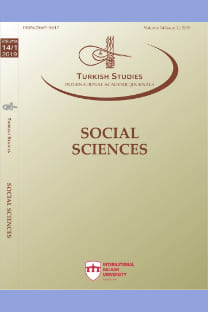THE IMPLICATIONS OF SETTLEMENT PROGRAM ON EXPASTORALISTS’ LIVELIHOODS IN SHABELLE ZONE, ETHIOPIAN SOMALI REGION
ETİYOPYA'NIN SHABELLE BÖLGESİNDE YERLEŞİK PROGRAM UYGULAMALARI
___
Abate, Allula Pankhurst and Piguet, F.(2004).Impact of resettlement in Beles Valley, Metekel; In people, space and the state. Migration, resettlement and displacemen in Ethiopia, Addis Ababa University.Abbute, W. 2003. Resettlement as a response to food insecurity: The case of Southern Nations, Nationalities and Peoples’ Region. Addis Ababa: UNEUE-emerging unit for Ethiopia.
Asfew (2006). The demographic Trasition and Development of Africa, The unique case of Ethiopia.George Washington University, Department of Global Health.
AFI.,(2012). Harvest help-African Food Issues.http://www.harvesthelp.org.uk/causes-of-foodisecurity-in-african-and-other-developng-countries.Html.
Alula, pankhurst and piguet, F.(2004). People, space and the state migration, resettlement and displacement in Ethiopia, Addis Ababa.
Awogbade, M.O,1991.’’Nomadism and Pastoralism: A conceptual Framework’’.I:G.Tahir(Ed.), Education and pastoralism in Nigeria.Zaria:Ahmadu Bello University Press.
Bugeke, C.J.1997. ‘’Nomadic education in Tanzania’’. In;C.Ezeomah (Ed),The educaton ofnomadic populations n Africa.Papers presented at the UNESCO ( Breda) regional Seminar on education of Nomadic populations in Africa.11-15 Dec 1995, Kaduna, Nigeria.Breda;UNNESCO.
Chamber, R and Conway, G. (1992).Sustainable Rural Livelihoods: Practical concepts for 21st century. IDS discussion paper. No. 269. Brighton
Devereux, S and Bruce Guenther. 2007. Social protection and agriculture in Ethiopia. A Country case study paper prepared for a review commissioned by the FAO on Social Protection and support to small farmer development. Institute of Development Studies. Sussex: University of Sussex
De Wet, C. 2004. Why do things so often go wrong in resettlement in People, space and the state: migration, resettlement and displacement in Ethiopia edited by A Pankhurst and F Piguet.
Addis Ababa: ESSSWA and the United Nations Emergencies Unit for Ethiopia.
Ezewu.E.E.;Tahir,G.(Eds.).1997.Ecology and education in Nigeria; on the education of Migrant Fishermen.Onitsha;Tabansi publisher.
FAO/WFP. 2007. Crop and food supply assessment mission to Ethiopia, Food and Agriculture Organisation of the United Nations and World Food Programme Special report. Rome: FAO.
FDRE. 2010. Growth and Transformation Plan 2010/11– 2014/15. Volume I & II. Main Text. Federal Democratic Republic of Ethiopia. Addis Ababa: Ministry of Finance and Economic Development.
FDRE. 2002. Ethiopia: Sustainable Development and Poverty Reduction Programme (SDPRP). Federal Democratic Republic of Ethiopia. Addis Ababa: Ministry of Finance and Economic Development.
Jamma,Sh.(2009). Challenges and Prospects of resettlement Program, Haramaya University, Ethiopia, Masters Thesis,2009.
Galaty.(1981).Involuntary Resettlement In Africa,selected papers from a conference on Enveronmental and Resettlement Issues in Africa,
Hussein, B.,2006. Major causes of household Food insecurity in Wuchale-Jidda Woreda, Oromia National Regional State.M.A thesis, Addis Ababa University, Ethiopia.
Kratli,S;Swift,J.2001. Educating nomadic herders out of poverty, culture, education, and poverty in Turkana & Karamoja.Brighton;W.B.IDS.
Lewis,.R.(1961). Involuntary Migration and Resetlement:The problems and Responses of Dlocated People,Ethiopia.
Mulaw, G. T. (2010) Assessing the Rural Resettlement Programme in Ethiopia in meeting the Livelihood of the people: A Case Study of Metema yohanes Resettlement Scheme, in the Amhara National Regional State. A Research Pape.International Institute of Social Studies, Graduate School of Development Studies.
Pankhurst, Alula, 2004,Longer term Implications of Resettlement in Ethiopia in Francois Piguet ( ed) people, Space and the State Proceedings of the Worksop by ESSANA and UNEUE.
Rahmato, D.(2006). Foo, safety nets and Social protect in Ethiopia;forum for social Protectio in Ethiopia,Addis Ababa University.
Ragsdale, Tod. A. and Abdullah Seck Ali.(1988). “A case study of the Resettlement of the Nomads in Somalia resettlement of nomads in Somalia ” in A.S. Oberai ( eds). Land settlement Policies and Population Redistribution in Developing Countries: Achievements, Problems, and Prospects. New York, London: PRAEGER
Stanford, S. 1978.’’ Welfare and Wandereus: ‘’The organization of social services for pastoralists’’.In: ODI Review, 70-87.
Tan, Y and Yao, F. 2006. Three gorges project: effects of resettlement on the environment in the reservoir area and counter measures. Journal of Population and Environment 23 (4): 351371.
Teshome, A. 2006. Agriculture, Growth and Poverty Reduction in Ethiopia: Policy Processes around the New PRSP (PASDEP). Future Agriculture Research Paper 004.
Vhugen, D. 2013. Large-scale commercial investments in land, seeking to secure land tenure and improve livelihoods. Haramaya Law Review 1 (1).
Woldemichael, B.1995. Education for the pastoral Communities of Eritrea; a research study. Asmara: Ministry of education of the state of Eritrea and Radda. Barnen/Swedish Save the Children.
- ISSN: 2667-5617
- Yayın Aralığı: 6
- Başlangıç: 2006
- Yayıncı: ASOS Eğitim Bilişim Danışmanlık Otomasyon Yayıncılık Reklam Sanayi ve Ticaret LTD ŞTİ
İRAN’IN SİBER GÜVENLİK STRATEJİSİNİN SALDIRI VE SAVUNMA KAPASİTESİ BAKIMINDAN ANALİZİ
RESSAMLARA İLHAM VEREN BİR ÇEŞME: ANADOLUHİSARI KIZIL SERÇE SOKAĞI ÇEŞMESİ
MOBBİNG VE İŞTEN AYRILMA NİYETİ ARASINDAKİ İLİŞKİ ÜZERİNE BİR ARAŞTIRMA
Erol TURAN, Yavuz DEMİREL, Sefa ÇETİN, Gülcan GÜLÜMOĞLU
BASINDA KADINA ŞİDDETİ OLUMLAYAN DİL KULLANIMI (BİR İNTERNET HABERCİLİĞİ ANALİZİ)
Elif Başak SARIOĞLU, Ebru ÖZGEN
Habibe AKÇAY BEKİROĞLU, Emine ŞAHİN
NİĞDE HÜDAVEND HATUN TÜRBESİ’NE İKONOGRAFİK YAKLAŞIM
VADİ MORFOMETRİSİ VE VADİ KAZILIM ORANI
VALLEY MORPHOMETRY AND VALLEY INCISION RATE
